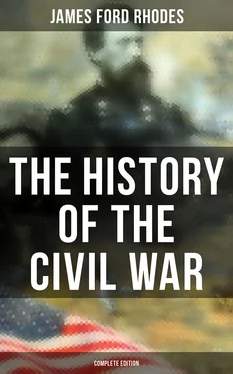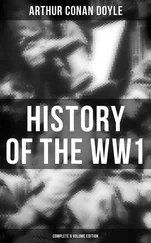James Ford Rhodes - The History of the Civil War (Complete Edition)
Здесь есть возможность читать онлайн «James Ford Rhodes - The History of the Civil War (Complete Edition)» — ознакомительный отрывок электронной книги совершенно бесплатно, а после прочтения отрывка купить полную версию. В некоторых случаях можно слушать аудио, скачать через торрент в формате fb2 и присутствует краткое содержание. Жанр: unrecognised, на английском языке. Описание произведения, (предисловие) а так же отзывы посетителей доступны на портале библиотеки ЛибКат.
- Название:The History of the Civil War (Complete Edition)
- Автор:
- Жанр:
- Год:неизвестен
- ISBN:нет данных
- Рейтинг книги:5 / 5. Голосов: 1
-
Избранное:Добавить в избранное
- Отзывы:
-
Ваша оценка:
- 100
- 1
- 2
- 3
- 4
- 5
The History of the Civil War (Complete Edition): краткое содержание, описание и аннотация
Предлагаем к чтению аннотацию, описание, краткое содержание или предисловие (зависит от того, что написал сам автор книги «The History of the Civil War (Complete Edition)»). Если вы не нашли необходимую информацию о книге — напишите в комментариях, мы постараемся отыскать её.
This Pulitzer Prize winning book remains one of the best histories on the topic of American Civil War to this day. For the purpose of writing this comprehensive work, the author used the most authoritative documents and sources including Personal Traits of Lincoln, Life and Letters of General Meade, Diary of Gideon Welles, The Reminiscences of Carl Schurz and Official Records of the Union and Confederate Navies.
The History of the Civil War (Complete Edition) — читать онлайн ознакомительный отрывок
Ниже представлен текст книги, разбитый по страницам. Система сохранения места последней прочитанной страницы, позволяет с удобством читать онлайн бесплатно книгу «The History of the Civil War (Complete Edition)», без необходимости каждый раз заново искать на чём Вы остановились. Поставьте закладку, и сможете в любой момент перейти на страницу, на которой закончили чтение.
Интервал:
Закладка:
McClellan wrote of his Ohio troops: "I have never seen so fine a body of men collected together. The material is superb but has no organization or discipline." 82A captain of the regular army who came to muster a number of these regiments into the United States service, looking down the line of stalwart men, clad in the Garibaldi red flannel shirt (for lack of uniforms) exclaimed, "My God! that such men should be food for powder!" 83"Good-looking and energetic young fellows, too good to be food for gunpowder," wrote John Hay of the Sixth Massachusetts! 84And the same remark might have been made of nearly all the three-months men from every State.
Before the end of April, Lincoln had made up his mind that he had embarked on a long war. The quotas of three-months volunteers were rapidly filled and, as more men came forward, he determined to turn the prolonged outburst of patriotism to account by prevailing upon the late-comers to enlist for three years. On May 3, he increased the army by proclamation. 85The response to his different calls for troops was thus described in his Fourth-of-July message: "One of the greatest perplexities of the government is to avoid receiving troops faster than it can provide for them. In a word, the people will save their government if the government itself will do its part only indifferently well." Our Secretary of War (Cameron), to judge from the official correspondence during the first months of the war, appears to have been good-natured, inefficient, short-sighted,-a man of narrow views. Lincoln, on the other hand, keenly alive to the situation, was repeatedly urging the War Department to accept the men who offered themselves for three years and take the chance of providing them with arms, uniforms and monthly pay; thus, in the beginning, even as in the later years of his presidency, his first thought was for the chief requirement of his side; he would have the men; the provision to be made for them could be left to the future.
The unpreparedness of the Southern people was similar to that of the Northern, but their difficulty in procuring arms and ammunition was greater. Accustomed as they had been to buy their powder from Northern factories, they were now obliged to develop this industry within their own borders. With less money and inferior credit they found it more difficult to make purchases abroad; moreover the blockade soon became a serious impediment to their commerce. On May 3, General Scott wrote, "We rely greatly on the sure operation of a complete blockade of the Atlantic and Gulf ports soon to commence." 86Mrs. Chesnut, who had dined with Jefferson Davis in Richmond on July 16, set down in her diary, "We begin to cry out for more ammunition and already the blockade is beginning to shut it all out." The Confederate Secretary of War [Walker] seemed to lack geniality and showed in his correspondence with the governors more acerbity than was desirable in an officer of a new government organizing for a protracted conflict. On the other hand, Davis was at first superior in administrative capacity to Lincoln. His West Point training, army service in Mexico and efficient conduct of the War Department for four years had made him familiar with military details which Lincoln had now to master with painful effort. Lee, as commander of the Virginia forces, was an efficient aid to the governor in Richmond, which city was destined to be the most important military point in the Confederacy; but, affected by the disposition that prevailed on each side to overrate the other, he, like the governor of Iowa, thought that the enemy had much superior arms. 87
In perusing the confidential Union and Confederate correspondence between the bombardment of Sumter and the battle of Bull Run, one is struck with the unreadiness of both South and North for war and with the contrast generally between military conditions in this country and in Europe. In 1870, the French minister of war told his colleagues and the Emperor that France was ready, more than ready, and to a commission of the Corps Legislatif, declared, "So ready are we that, if the war were to last two years, not a gaiter button would be found wanting." Within ten days he had transported by railroad to the frontier nearly 200,000 men with cannon, horses and munitions. Meanwhile Bismarck was asking Moltke, "What are our prospects of victory?" "I believe," replied Moltke, "that we are more than a match for them always with the reservation that no one can foresee the issue of a great battle." And "a rapid outbreak is, on the whole, more favorable to us than delay." In a little over a fortnight's time, Moltke had a Prussian army more than twice as large as the French on the French frontier. 88
Had either South or North had the comparatively imperfect preparation of France, with no similar development on the part of the other, that side would have swept everything before it. Had both South and North had the perfect organization of Prussia, the war might have been shorter. But the Prussian military system was impossible in the United States and even if possible, it would not have been considered worth while. The Americans, like the Athenians of the time of Pericles, then preferred "to meet danger with a light heart but without laborious training." 89
Davis, in his message of April 29 to his Congress, maintained that Lincoln's call for 75,000 troops was a declaration of war against the Confederacy and he asked them to devise measures for their defence. Arguing that each State was sovereign and "in the last resort the sole judge as well of its wrongs as of the mode and measure of redress," he justified secession and the formation of the Confederate States. "We feel that our cause is just and holy," he declared. " … All we ask is to be let alone; that those who never held power over us shall not now attempt our subjugation by arms. This we will, this we must, resist to the direst extremity." Davis as President was obliged to make the best out of a situation which he regarded with considerable misgiving. He had been averse to war and had wished his Southern brethren less precipitate. Toward the end of June in Richmond, Mrs. Chesnut had with him a talk of nearly an hour, through which there ran, on his part, "a sad refrain." "His tone was not sanguine." He anticipated a long war. He laughed at the common brag that "every Southerner was equal to three Yankees. Only fools," he continued, "doubted the courage of the Yankees or their willingness to fight when they saw fit." 90
The Confederates, said the President in his Fourth-of-July message, "forced upon the country the distinct issue, 'immediate dissolution or blood.' It was with the deepest regret that the executive found the duty of employing the war power in defense of the government forced upon him. He could but perform this duty or surrender the existence of the government." Using an expression of which he grew fond, "the plain people," he addressed to them an argument in support of his position.
Lincoln of all men in 1861 was most thoroughly convinced that the Southerners would never have carried the doctrine of State-rights to the point of secession had it not been for the purpose of repelling what was considered an aggression on slavery; yet in his message there is not a word on this subject and the reason is not far to seek. Restricting the object of the war to the restoration of the Union, he had with him Democrats and Bell and Everett men as well as Republicans; a mention of slavery would at once have given rise to partisan contentions. At this early day, however, Lincoln understood the scope of the conflict and thus unbosomed himself to the private secretary who was in sympathy with him: "For my own part, I consider the central idea pervading this struggle is the necessity that is upon us of proving that popular government is not an absurdity. We must settle this question now, whether, in a free government, the minority have the right to break up the government whenever they choose. If we fail, it will go far to prove the incapability of the people to govern themselves. There may be one consideration used in stay of such final judgment but that is not for us to use in advance: that is, that there exists in our case an instance of a vast and far-reaching disturbing element, which the history of no other free nation will probably ever present. That, however, is not for us to say at present. Taking the government as we found it, we will see if the majority can preserve it." 91
Читать дальшеИнтервал:
Закладка:
Похожие книги на «The History of the Civil War (Complete Edition)»
Представляем Вашему вниманию похожие книги на «The History of the Civil War (Complete Edition)» списком для выбора. Мы отобрали схожую по названию и смыслу литературу в надежде предоставить читателям больше вариантов отыскать новые, интересные, ещё непрочитанные произведения.
Обсуждение, отзывы о книге «The History of the Civil War (Complete Edition)» и просто собственные мнения читателей. Оставьте ваши комментарии, напишите, что Вы думаете о произведении, его смысле или главных героях. Укажите что конкретно понравилось, а что нет, и почему Вы так считаете.












